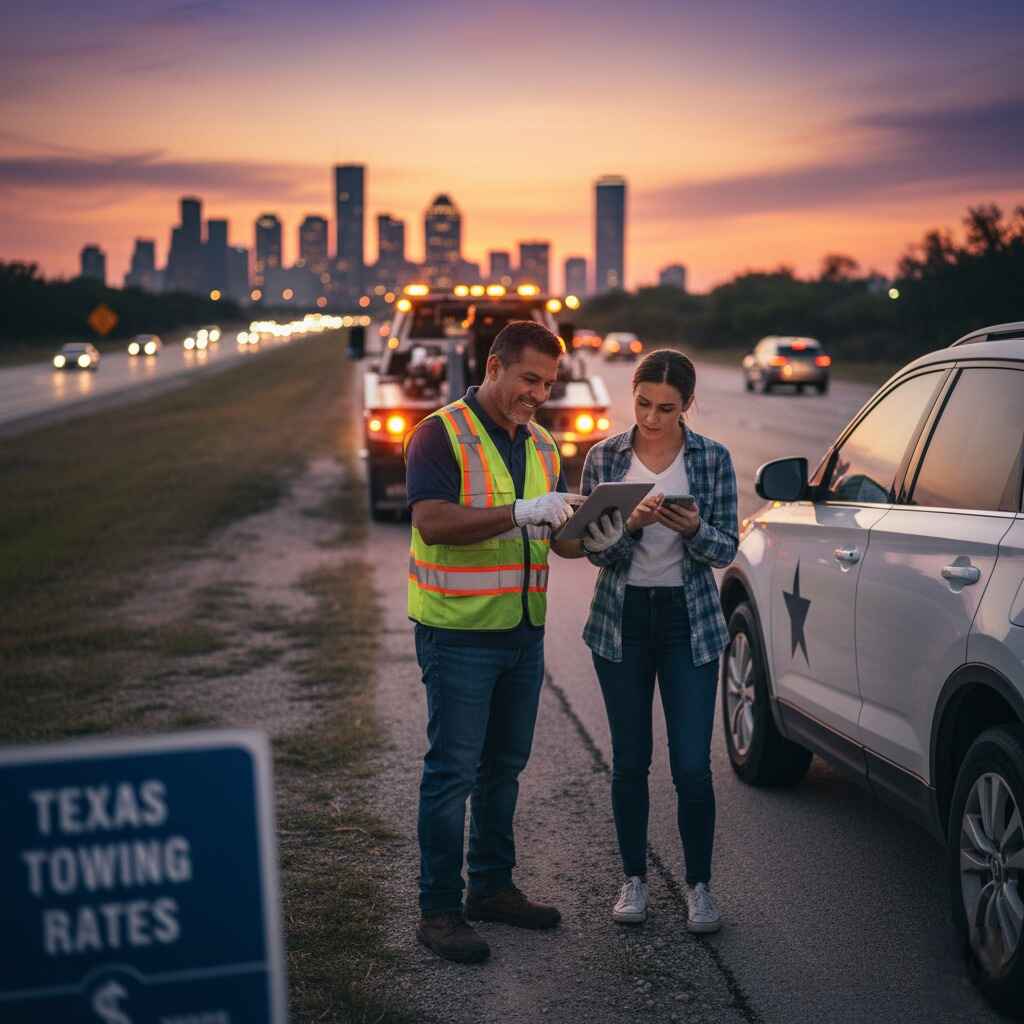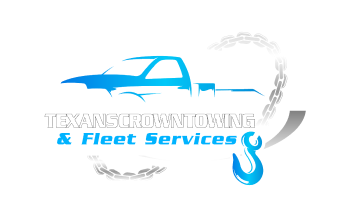That sinking feeling when your car finally gives up the flashing lights, the quiet roadside, the realization that your day just got derailed. It’s stressful enough without the headache of guessing, how much does towing cost?
For any Texan, whether you’re stranded on I-35 or just need a long-distance haul, knowing the real cost of a tow truck in the Lone Star State is essential. Unfortunately, towing prices aren’t a single, fixed number. They’re a puzzle of fees, mileage rates, and situational surcharges. But you deserve transparency, not a surprise bill.
This definitive guide breaks down the true cost of towing services in Texas, giving you the insider knowledge to handle your breakdown with confidence and clarity.
The $75–$150 Question: Understanding the Base Fee
When you call for a tow—what’s often called a “consent tow” because you, the owner, are requesting it—the first charge is almost always a Base Fee. This is a flat rate that covers the company’s cost to dispatch a truck, travel to your location, and safely secure your vehicle onto the tow rig.
For most standard passenger vehicles in Texas, this base rate typically falls between $75 and $150.
This initial fee often includes a minimum mileage, usually the first 5 to 10 miles. If your destination is within that range, that Base Fee is your entire bill! But the real price shift happens the moment you exceed that initial distance.
The 4 Core Factors That Determine Your Final Towing Bill
To accurately answer how much does towing cost in Texas, you must understand the four variables that turn that base fee into a final invoice.
1. Distance & the Per-Mile Rate
After the initial included mileage, a per-mile charge is added for the remaining distance. This is the single biggest variable in your bill.
| Distance Scenario | Typical Per-Mile Rate | Estimated Total Cost (Non-Winch) |
| Local Tow (0–10 miles) | N/A (Included in Base Fee) | $75 – $150 |
| Medium Tow (10–50 miles) | $4.00 – $7.00 per mile | $150 – $350+ |
| Long-Haul (50+ miles) | Often a Negotiated Flat Rate | $350+ |
Always ask for the total estimated cost to the final destination, not just the hook-up fee and the per-mile rate separately. A reputable company will provide a clear, all-in quote.
2. Your Vehicle’s Size and Type (The Flatbed Premium)
Towing a lightweight sedan is fundamentally different from towing a fully-loaded F-250. Bigger and heavier vehicles require specialized, heavy-duty tow trucks, which cost the company more to operate, insure, and maintain.
Standard Sedan: Typically the lowest cost, often handled by a less expensive wheel-lift tow truck.
Large SUV or Pickup Truck: Expect a $25 to $75 surcharge on the base fee. These often require heavier equipment or a flatbed.
All-Wheel Drive (AWD), Luxury, or Electric Vehicles (EVs): These vehicles must be towed on a flatbed tow truck to prevent severe and expensive damage to the drivetrain or battery systems. This superior safety often incurs a $50 to $100 premium over a standard tow.
3. Time of Day (The After-Hours Surcharge)
Life doesn’t stop at 5 PM, but towing companies have employees, and people expect to be paid more to work the graveyard shift or on holidays.
Standard Hours (M–F, 8 AM–5 PM): Base rates apply.
After-Hours/Weekend/Holiday: Expect a 25% to 50% surcharge on the base fee, or a flat additional rate of $50 to $150. The cost of a tow at 3:00 AM on Christmas will always be higher than at 2:00 PM on a Tuesday.
4. The Recovery Factor (Winching & Extraction)
This is the largest source of unexpected fees. If your vehicle isn’t on a safely paved, accessible surface (e.g., it’s stuck in a ditch, mud, or over an embankment), you need Recovery or Winching services.
Cost: Recovery is often billed at an hourly rate, commonly between $150 and $300 per hour, starting the moment the extraction process begins.
Expert Insight: A fast, experienced operator from quality towing services in Texas is the key here. Their expertise minimizes the time—and therefore, the cost—of the recovery.
Beyond the Breakdown: The Cost of Non-Consent/Impound Tows in Texas
Not all tows are requested by the driver. This is where state regulations become crucial. “Non-consent” tows happen when your vehicle is towed without your permission (e.g., illegal parking, police-ordered removal after an accident).
The Texas Department of Licensing and Regulation (TDLR) sets maximum fee limits for these situations to protect consumers.
| Non-Consent Towing Fees (TDLR Maximums, Subject to Change) | Max Fee | Context |
| Tow Charge (Up to 10,000 lbs) | $272 | The maximum a tow company can charge to tow the vehicle from the scene. |
| Vehicle Storage Facility (VSF) Daily Storage | ≈$22.85 per day | Charged by the storage facility after the first 24 hours. |
| Impoundment Fee | $20 | Fee for securing the vehicle (locking doors, logging personal items) at the VSF. |
The key takeaway here is this: If your car is impounded, you are paying the tow company and the vehicle storage facility. The faster you retrieve it, the less you will pay in daily storage fees.
Smart Money: Does Insurance or Texas Roadside Assistance Cover the Cost?
Before you panic, check your coverage. Many drivers already have partial or full towing coverage without realizing it, which can significantly reduce the amount you pay out of pocket.
Personal Auto Insurance (Comprehensive/Collision): Many policies offer a low-cost “Roadside Assistance” add-on. This often covers the first 5 to 10 miles of a tow or a flat rate (e.g., $50 to $100). This is usually enough for a local tow to a nearby mechanic.
Roadside Assistance Memberships (e.g., AAA, credit card programs): These plans typically cover a certain distance (often up to 100 miles) or a fixed dollar amount, making them one of the cheapest ways to get a tow.
Warranty/Manufacturer Programs: If your vehicle is new or under warranty, check if the manufacturer includes free roadside assistance.
Knowing this upfront can be the difference between paying $150 and paying nothing at all. Every driver in Texas should have a plan for Texas roadside assistance.
FAQs: Straight Answers on Towing Costs
Q1: What is the average cost to tow a car in Texas?
The average cost for a standard local tow (under 10 miles) in Texas typically ranges from $95 to $150, including the base “hook-up” fee. The price increases by $4 to $7 per mile for longer distances.
Q2: Is flatbed towing more expensive?
Yes. Flatbed towing provides the safest transport, especially for AWD, luxury, or severely damaged vehicles. It often carries a $50 to $100 premium over a basic wheel-lift tow due to the specialized equipment and extra care required.
Q3: What is the cheapest way to get a tow?
The cheapest way is often through a roadside assistance program included with your auto insurance or a membership (like AAA). If you pay out-of-pocket, compare quotes from local companies during standard business hours (M–F, 8 AM–5 PM) and be precise about your vehicle type and location.
Q4: Can a tow company charge me extra if my car is stuck in a ditch?
Yes. If your car is not safely on a paved surface, the company will charge for winching and recovery services, which are typically billed hourly at $150–$300 per hour, in addition to the base tow fee.
Q5: How fast do I have to pick up my car from a tow yard (VSF) in Texas?
You should retrieve your vehicle as quickly as possible. Vehicle Storage Facilities (VSFs) charge a daily storage fee (currently around $22.85/day) that begins after the first 24 hours. These fees accumulate rapidly.
Your Peace of Mind is Priceless
In the end, while knowing how much does towing cost is important, the true value lies in securing reliable, professional help when you need it most. A cheap tow that causes damage is an expensive lesson learned. A transparent, fast, and professional tow is a priceless investment in your peace of mind.
Don’t be left stranded guessing your bill. The next time you face a roadside emergency, trust the experts who prioritize clear pricing and professional service.
At Texans Crown Towing, we’re here to help with professional, fast, and friendly towing and roadside assistance—wherever and whenever you need us. Call us 24/7 for a transparent, all-in quote and get back on the road safely.



